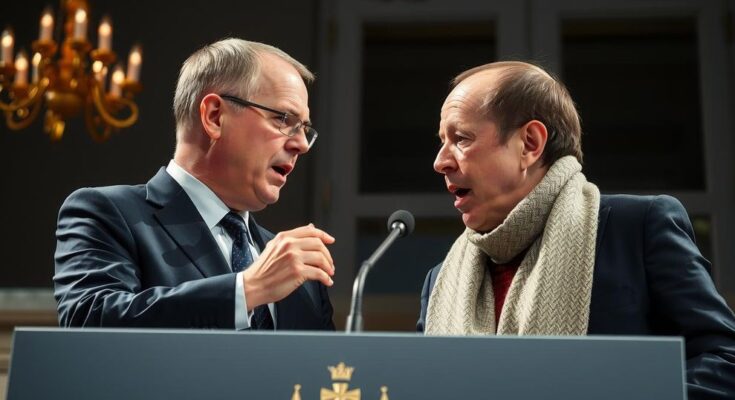German Chancellor Olaf Scholz rebuked Elon Musk for endorsing the far-right AfD party during his New Year’s address. Scholz emphasized that German citizens, not social media owners, should determine political outcomes. Musk’s animosity toward mainstream politicians and support for the AfD has elicited widespread condemnation, raising questions about future governance and election outcomes in Germany.
In his New Year’s address, German Chancellor Olaf Scholz directly addressed recent comments by Elon Musk concerning the upcoming snap election in Germany. Scholz, without naming Musk, asserted, “You, the citizens, decide what happens in Germany. It’s not up to the owners of social media.” This statement came following Musk’s endorsement of the far-right Alternative for Germany (AfD) party, which has sparked significant backlash among German politicians.
Musk’s public support for the AfD was further showcased in an opinion piece he published in the German newspaper Welt am Sonntag. Following his comments, German Vice Chancellor Robert Habeck articulated his concerns, stating, “Musk is strengthening those who are weakening Europe.” The exchanges underline a troubling trend, highlighting Musk’s growing favoritism toward right-wing populist politics in Europe and targeting mainstream German politicians with derogatory remarks.
The AfD, categorized as a suspected extremist organization by Germany’s federal domestic intelligence, has gained prominence since its inception in 2013. Musk’s vocal endorsement raises alarms about potential implications for Germany’s political landscape, particularly given the current polling that favors Germany’s conservative alliance led by Friedrich Merz. Merz himself has suggested a future underpinned by cooperative dealings with the United States, should he secure victory.
Scholz concluded his remarks by emphasizing the importance of the majority, stating that while extreme opinions may dominate discussions, “the vast majority of reasonable and decent people will decide the outcome of the February election.” This underscores a call for citizens to engage in the democratic process amidst outside influences.
The political landscape in Germany has been influenced by the emergence of the far-right party Alternative for Germany (AfD), which has gained notoriety for its extremist views since its establishment in 2013. Recent remarks from Elon Musk, who has voiced support for the AfD and criticized Germany’s mainstream politicians, have incited controversy. Scholz’s response is emblematic of a larger struggle between populist sentiments and traditional political institutions in Europe, particularly in the face of impending elections that could reshape governance and policy direction.
In summary, Chancellor Olaf Scholz’s New Year’s address addressed the challenges posed by external influences, particularly from figures like Elon Musk, who endorses far-right politics. Scholz’s strong assertion of democratic values serves as a reminder of the importance of citizen involvement in elections. The situation exemplifies the tension between populism and established political norms in Germany, as the AfD’s rise presents potential ramifications for the nation’s future governance.
Original Source: www.politico.eu




